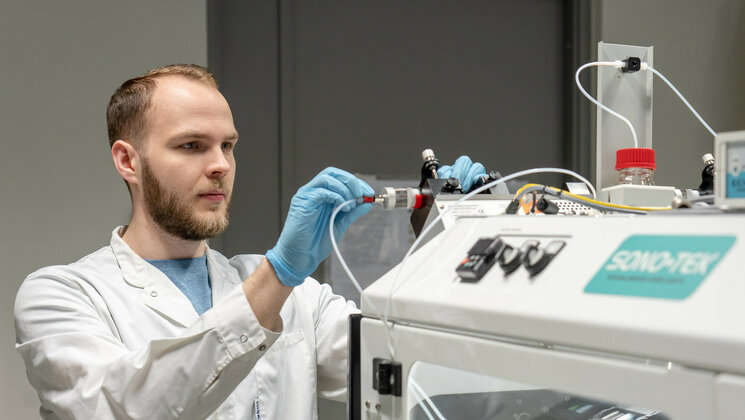|
Introducing the Intelligent Computer Vision (iCV) Lab
Established in 2013, the iCV Lab at the Technology Institute of the University of Tartu stands as a beacon of innovation in the European computer vision landscape. At iCV, our quest for knowledge spans a diverse array of applications in computer vision, human behavior analysis, and 3D modeling. Our team, comprising highly skilled and motivated individuals, is at the forefront of technological advancements in these domains.
Our research endeavors encompass a broad spectrum of areas:
- Image Processing: We delve into sophisticated techniques like watermarking, enhancing image illumination and contrast, as well as pioneering in the realms of Image and Video Super-Resolution (SR), Coding and Compression. Our work in High Dynamic Range (HDR) imaging and Tone Mapping (TM), alongside Video Coding, is reshaping the boundaries of visual media.
- Human-Computer Interaction: Our lab is a hub for groundbreaking research in Multimodal Emotion Recognition and Gesture Recognition. Notably, our developments in the Soccer NAO Robots Vision System are setting new standards in robotic visual perception.
- Machine Learning: We are at the vanguard of Late and Early Fusion methodologies, Supervised and Semi-Supervised Learning, and cutting-edge Deep Learning techniques. Our approach is continually refined to address complex real-world challenges.
- Computer Graphics: Our expertise extends to 3D Image Modeling, sophisticated Visualization techniques, Retexturing, and immersive Virtual Reality experiences.
Central to our mission is the pioneering work in object recognition, particularly its application in the development of autonomous vehicles. This research is critical in advancing the safety and efficiency of self-driving cars, a cornerstone in the future of transportation.
In the financial sector, our lab is making significant strides in credit score analysis. By leveraging advanced machine learning algorithms, we provide nuanced insights that are transforming how financial services assess and manage credit risks.
Furthermore, our exploration of Large Language Models (LLMs) and generative AI is revolutionizing the sphere of social media. By developing safer, more intelligent algorithms, we are paving the way for new forms of digital interaction that prioritize user security and ethical AI practices.
At the iCV Lab, our commitment to excellence and innovation is unwavering. We are not just conducting research; we are shaping the future of technology, one breakthrough at a time. Our work, rooted in scientific rigor and creative exploration, is a testament to our role as leaders in the evolving landscape of computer vision and AI.
Areas of research
The iCV Lab specializes in image processing, human-computer interaction, machine learning, and computer graphics, with a focus on applications such as object recognition for autonomous vehicles, credit score analysis for financial services, and the use of LLMs and generative AI in social media.
Keywords
Computer Vision; Machine Learning; Human-Computer Interaction; Autonomous Systems; Generative AI; Image Processing; Financial Analytics
Key people:
Prof. Shahab Anbarjafari
Assoc. Prof. Cagri Ozcinar
Dr. Egils Avots
Publications:
https://scholar.google.com/citations?user=6gN67JAAAAAJ&hl=en
Gholamreza Anbarjafari (Shahab)
Prof. Anbarjafari is recognized as Estonia's first affective computing scientist and a leading figure in this domain within the European Union. His pioneering research in facial expression analysis and first impression analysis has garnered substantial citations from both academic and industrial experts, reflecting his significant contributions to the field.
In 2013, he established the Intelligent Computer Vision (iCV) Research Lab at the University of Tartu. This initiative marked a milestone, positioning the lab as the foremost centre in the Baltic States for computer vision and applied machine learning.
As a co-founder of Estonia's first Responsible AI startup, iVCV, and its pioneering generative AI venture, Alpha3D, he has demonstrated a strong entrepreneurial spirit. His role as an early-stage angel investor further exemplifies his commitment to advancing cutting-edge technological ideas.
His technical acumen spans a diverse array of areas, including computer vision, human-robot interaction, natural language processing, 3D modelling, augmented and virtual reality, and generative AI. He is particularly adept in Python, Keras, and TensorFlow programming. His proficiency in utilizing OpenAI and LLM APIs is a testament to his forward-thinking approach to emerging AI technologies.
He has successfully led teams in numerous R&D projects, collaborating with industry giants. His status as a distinguished member of the academic community is highlighted by his service as Chair of the IEEE Estonian section's Joint Societies Chapter and his position as an IEEE Senior Member.
His scholarly contributions are substantial, with over 300 publications including conference papers, journal articles, books, and patents. He is an associate editor for several prestigious journals and has served as the chief guest editor for special issues focusing on human behaviour analysis.
In academia, he has mentored ten doctoral and over thirty MSc students, nurturing the next generation of scientific minds. His leadership in organizing workshops at major conferences like FG17, CVPR17, ICCV17, ECML19, FG20, and FG24 demonstrates my dedication to advancing AI.
He has been honored with grants from respected entities such as the Scientific and Technological Research Council of Turkey, the Estonian Research Council, and the European Union.
His career exemplifies excellence in the realms of computer vision, machine learning, AI, and data science. He is deeply committed to mentoring emerging talents, driving innovation, and contributing significantly to the evolution of intelligent technology. His work has played a pivotal role in elevating the standing of the iCV Lab, the Institute of Technology, and Estonia in the global technological landscape.
|

